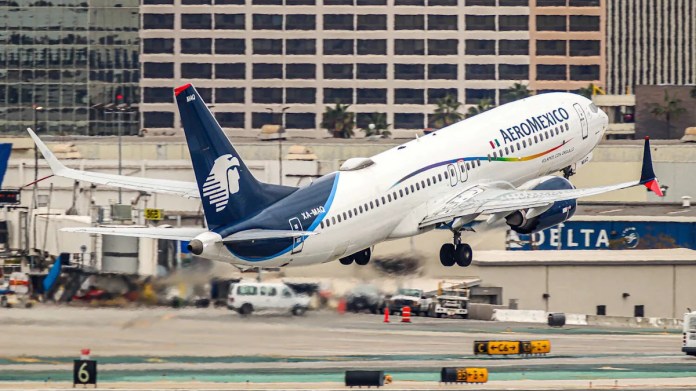Update, 4:38 p.m. October 30, 2025:
One day after U.S. Transportation Secretary Sean P. Duffy ordered the immediate cancellation of more than a dozen flight routes between the United States and Mexico, officials in McAllen – whose McAllen International Airport is one of four Texas airports affected by the route cancellations – issued a response condemning the order.
“McAllen stands at the front line of regional connectivity, commerce and community. A ban on flights to Mexico strikes at the heart of our binational economy, our families, and our cultural ties,” McAllen Mayor Javier Villalobos stated in a news release on Thursday.
Mexico’s flagship air carrier, Aeromexico, began offering daily nonstop flights from McAllen to Felipe Angeles International Airport in Mexico City at the start of February 2024. At the time, the international route was much vaunted by McAllen city leaders, who said it would help propel regional economic development.
The new route also came amidst years-long efforts by the city to expand business and diplomatic relationships in Mexico. Those efforts have included trade missions to the Mexican states of Jalisco, San Luis Potosi, Querétaro, Tamaulipas, and others, as well as sister city or friendship city agreements with numerous Mexican cities. On Thursday, officials said the Aeromexico route to the Mexican capital is vital to those diplomatic and economic efforts.
“This route has been a strong performer for McAllen and the entire Rio Grande Valley. It’s more than a flight, it’s a vital economic artery that supports commerce, tourism, and family connections across our binational region,” McAllen City Manager Isaac “Ike” Tawil said in the release. “We recognize the importance of protecting the livelihoods of our constituents and the economic momentum we’ve built together.”
The city has also called on the Valley’s federal lawmakers to intercede, including U.S. Reps. Vicente Gonzalez and Henry Cuellar – both Democrats – and Republican Sens. John Cornyn and Ted Cruz, along with U.S. Rep. Monica De La Cruz, whose District 15 encompasses McAllen. Already, the Valley delegation is working to find solutions that support “national security goals.”
“McAllen encourages the U.S. Department of Transportation and its counterpart in Mexico to work quickly to fully restore full network connectivity,” Tawil said.
Original story:
The Trump administration has unilaterally cancelled more than a dozen existing or planned flight routes between the United States and Mexico as part of a crackdown on what it calls Mexico’s “continued abuse” of a decade-old aviation agreement.
The cancellation halts Mexican carriers from flying so-called “combination service” routes that transport both passengers and cargo into the United States. The new order, handed down by U.S. Transportation Secretary Sean P. Duffy this week, affects flights originating from Felipe Angeles International Airport – which is located about 24 miles north of the Mexican capital – to more than a dozen American airports, including four in Texas.
“Mexico has illegally cancelled and frozen U.S. carrier flights for three years without consequences. All the while, Mexican carriers have been adding new routes and services between MEX and the United States,” federal transportation officials stated in a news release on Tuesday, October 28. “MEX” refers to the largest airport in Mexico City, the Benito Juarez International Airport.
What airports are affected by the route cancellations?
Among the Texas routes now impacted are Aeromexico’s flights from Felipe Angeles to the George Bush International Airport in Houston and McAllen International Airport (MFE), and Aerobus’ proposed routes to Austin-Bergstrom International Airport, Dallas-Fort Worth International Airport, and Houston.
The McAllen route had been a much-celebrated recent addition to the Rio Grande Valley’s busiest airport. McAllen welcomed the Mexican flagship carrier with passenger flights that started just last February. The arrival of Aeromexico was part of a massive growth spurt for McAllen, which also welcomed Volaris and new Delta routes in 2024.
Other impacts include Aeromexico and Volaris routes from Mexico City to San Juan, Puerto Rico, and Newark, New Jersey, and Aerobus’ proposed routes to New York City, Orlando, Florida, Denver, Colorado, Los Angeles, and Miami.

Shown is the terminal entrance at the McAllen International Airport. (Courtesy City of McAllen)
Why is the United States canceling Mexican flight routes?
U.S. officials allege that the Mexican federal government has interfered with the ability of American airlines to competitively operate in Mexico by deliberately gaming which carriers have access to the country’s largest and busiest airport. Since 2023, the Mexican government has intentionally frozen American carriers out of operating at MEX, in part, to attempt to stimulate growth at nearby Felipe Angeles International Airport, transportation officials stated in Tuesday’s order halting the routes.
“(T)he Department found that the magnitude of these moves by the Mexican authorities calls into question the extent to which the (government of Mexico) may use… practices at MEX to skew competitive dynamics between air carriers or airports,” the order reads, in part.
In February 2023, Mexico’s then-President Andres Manuel Lopez Obrador issued a presidential order prohibiting airlines from conducting cargo-only flights out of the Mexico City airport. But combination service flights – those where airlines carry both passengers as well as cargo in a plane’s belly – were still allowed. That decree put American air cargo carriers at a “competitive imbalance” as they were forced to take on higher costs to move operations to other Mexican airports, U.S. officials claim.
At the same time, Mexican officials had also reduced overall flight capacity at MEX by declaring that the airport had become too “saturated.” As a result, the Mexican airport revoked the takeoff and landing permits for three American carriers (American, Delta and United), and three Mexican carriers (Aeromexico, Viva Aerobus and Volaris), which flew passenger routes.
“It is notable that these sudden capacity reductions at MEX were implemented at a time when the (government of Mexico) was actively looking to increase traffic at NLU, which – despite efforts from the Lopez Obrador administration – was struggling to attract services,” Tuesday’s transportation order reads.
This article originally published at Texas officials scramble after Trump administration halts U.S.-Mexico flights.


